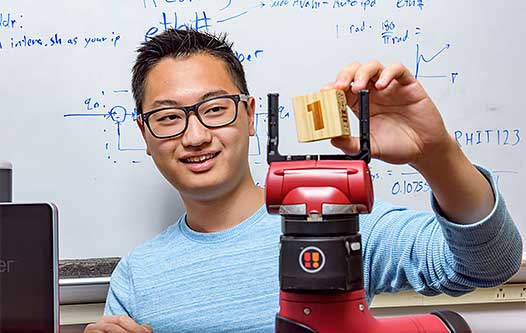AI Group Aims Big: Aid Humanity, Compete for Millions

This competition tackles the world’s grand challenges, millions of dollars on the line. A Rose-Hulman team is in the hunt.
Watson blazed into American culture by humbling Jeopardy uber-champion Ken Jennings at his own game. IBM next focused its natural-language supercomputer on managing cancer treatment. Now, a $5 million competition invites teams to “develop and demonstrate how humans can collaborate with powerful AI technologies to tackle the world’s grand challenges.” Rose-Hulman has set upon the task in earnest, with faculty and students in six academic departments gearing up for the four-year challenge, culminating in a final showdown at TED 2020.
The Rose-Hulman AI Group has cleared the first hurdle as one of 147 teams selected to compete in the IBM Watson AI XPRIZE. The real stakes, according to mathematics professor Yosi Shibberu, involve not the considerable cash prizes but extensive benefits to humanity. “Our project will benefit the 70 percent of America’s workforce without a college education,” he said. “Our goal is to develop an artificial-intelligence-mediated, user-friendly interface that will enable a nontechnical person to operate a robot to perform tasks too difficult for the robot to perform by itself.”
While most competitions task contenders with achieving a uniform goal, the AI XPRIZE invites each team to define its own objective. As a test case, Shibberu and team settled on enabling novice users to employ gestures and voice commands to control a robot to manipulate alphabet-printed wooden blocks. Seven faculty members representing multiple disciplines are already on task, to be joined by five students in an intensive summer internship.
The Rose-Hulman AI Group seeks to tie together existing capabilities such as robot arms, sensors for 3D vision, speech-to-text transcription and gesture tracking. According so Shibberu, “The challenge must benefit humanity and will save jobs by enabling humans to use common sense and empathy, two skills robots lack.”

